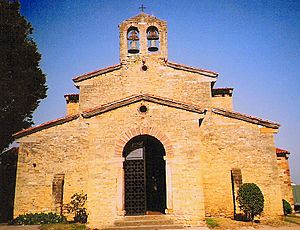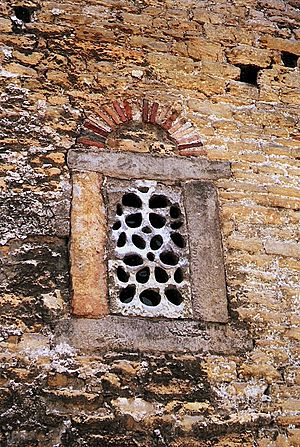San Julián de los Prados facts for kids
Quick facts for kids Church of San Julián de los Prados |
|
|---|---|

Facade of the church of San Julián de los Prados
|
|
| Religion | |
| Affiliation | formerly pre-Schism Hispanic Church, currently Roman Catholic |
| Ecclesiastical or organizational status | Church |
| Year consecrated | 9th century |
| Location | |
| Location | Oviedo (Asturias), Spain |
| Architecture | |
| Architect(s) | Tioda |
| Architectural type | Church |
| Architectural style | Pre-Romanesque |
| Specifications | |
| Direction of façade | SE |
| Length | 30 metres (98 ft) |
| Width | 25 metres (82 ft) |
| Type | Cultural |
| Criteria | ii, iv, vi |
| Designated | 1985 (9th session) |
| Parent listing | Monuments of Oviedo and the Kingdom of the Asturias |
| Reference no. | 312-005 |
| Region | Europe and North America |
San Julián de los Prados, also called Santullano, is a very old church in Oviedo, Spain. Oviedo is the capital city of Asturias. This church was built at the start of the 800s. It is a fantastic example of Asturian art.
The Spanish Ministry of Culture named it an Historical-Artistic Monument in June 1917. Later, UNESCO declared it a World Heritage Site on December 2, 1998. This means it is a very important place for everyone to protect.
King Alfonso II of Asturias ordered the church to be built. His court architect, Tioda, finished it around the year 830. The church is dedicated to two saints, Julian and Basilissa, who were martyrs from Egypt.
Contents
Amazing Architecture
This large church shows off its unique style very clearly. It has a basilican plan. This means it has a long central area called a nave. On each side of the nave are two aisles. Square pillars, called piers, separate the nave and aisles. These piers hold up rounded arches.
The church also has a transept, which is the part that crosses the main body of the church. It is very tall. An iconostasis separates the holy area (the sanctuary) from the rest of the church. It looks a lot like a triumphal arch.
The church's size and original design make it special. It stands out from older Visigothic art buildings. One of the most amazing things about this church is its painted decoration. These are aniconic frescoes, which means they don't show people or animals. They are painted in three layers and look like architectural designs. They show clear influences from ancient Roman art.
Even though it seems more like a church for monks, there was a special gallery for the king in the transept. This was a private area for him.
The church originally had three entrances. Today, two of these entrances have been closed off.
Beautiful Decorations
Sculptures You Can See
The only sculptures that are still there today are the marble capitals. These are the tops of the pillars that support the rounded arches. You can also see two marble slabs in the central chapel. They have cool hexagonal shapes and flower designs.
Incredible Paintings
The paintings in this church are the most important part of its decoration. They are truly special for their time. They cover a large area and are very well preserved. The variety of designs is also amazing. These paintings are considered the most important of their kind in all of Western Europe.
See also
 In Spanish: San Julián de los Prados para niños
In Spanish: San Julián de los Prados para niños
- Asturian architecture
- Catholic Church in Spain
- Spanish architecture
Gallery
 | Jackie Robinson |
 | Jack Johnson |
 | Althea Gibson |
 | Arthur Ashe |
 | Muhammad Ali |







